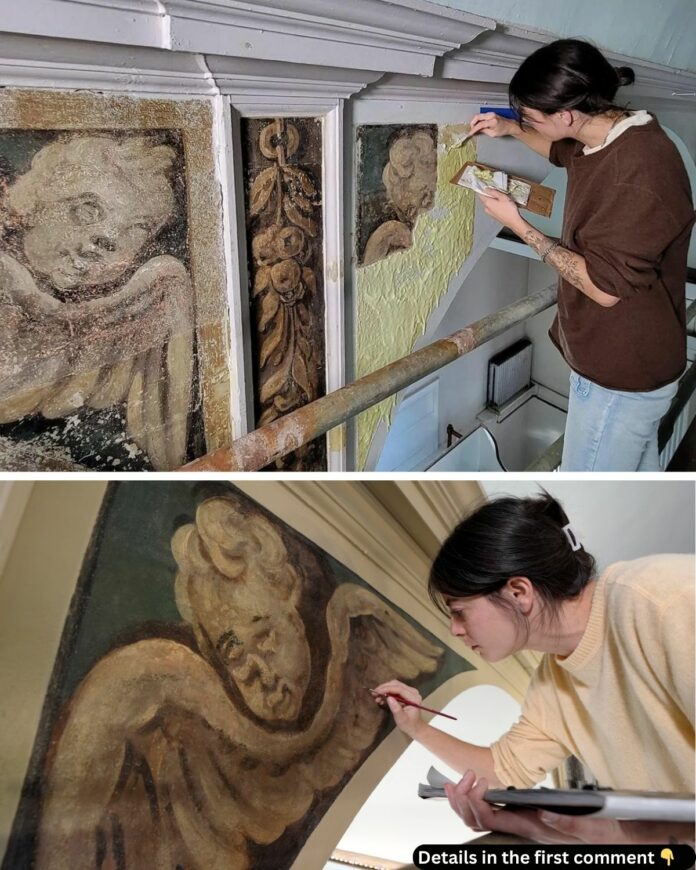Boston’s Old North Church, a historic icon of the American Revolution, has long stood as a testament to the nation’s fight for freedom. However, this storied landmark is now revealing a different part of its past—a colorful colonial heritage hidden beneath layers of white paint for over a century. Thanks to the meticulous efforts of conservator Gianfranco Pocobene and his team, long-lost murals of painted angels are being brought back to life, offering a glimpse into the vibrant artistry of 18th-century Boston.
The Angels of Old North Church: A Colonial Masterpiece
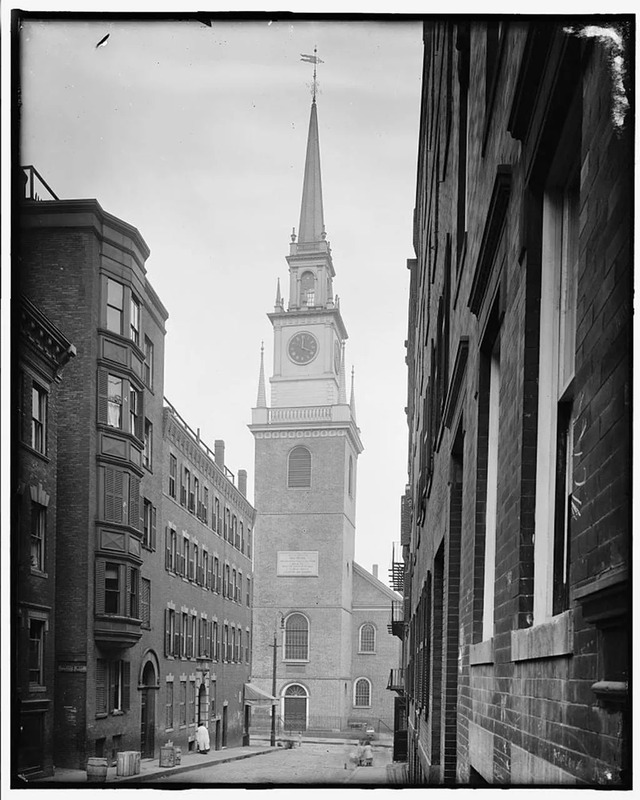
Built in 1723, Old North Church, originally known as Christ Church, is Boston’s oldest standing church. Its role in the American Revolution is legendary: the steeple famously displayed the “one if by land, two if by sea” lanterns used by Paul Revere to signal the British army’s approach. However, beyond its revolutionary legacy, the church served as a spiritual home for Boston’s colonial Anglican community.
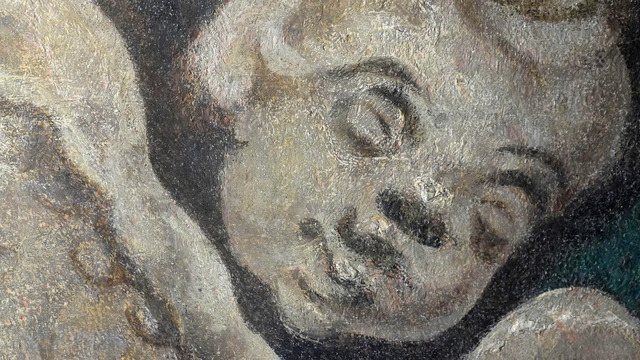
In the 1730s, John Gibbs, a talented artist and church member, painted a series of angelic murals on the church’s walls and arches. These cherubic figures, adorned with delicate wings and childlike faces, were part of a vibrant interior that also included foliage, fruit garlands, and ornate designs on the organ case and altar panel. These decorations reflected the Anglican congregation’s preference for color and grandeur, contrasting sharply with the austere Puritan churches that dominated Boston at the time.
In 1912, the murals were covered with seven layers of white paint during a renovation, transforming the church’s lively aesthetic into a minimalist one. For over a century, the angels remained hidden, their existence known only through historical photographs and written records.
Video:
The Restoration Journey: Unveiling the Angels
The restoration of these remarkable murals began in earnest in 2017, when an interior paint study confirmed the presence of the paintings beneath the layers of whitewash. Led by renowned conservator Gianfranco Pocobene, the project faced significant challenges. Removing seven layers of paint without damaging the nearly 300-year-old artwork required both precision and patience.
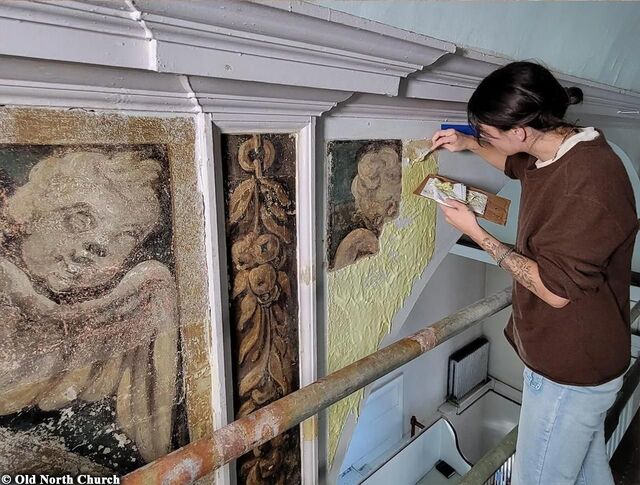
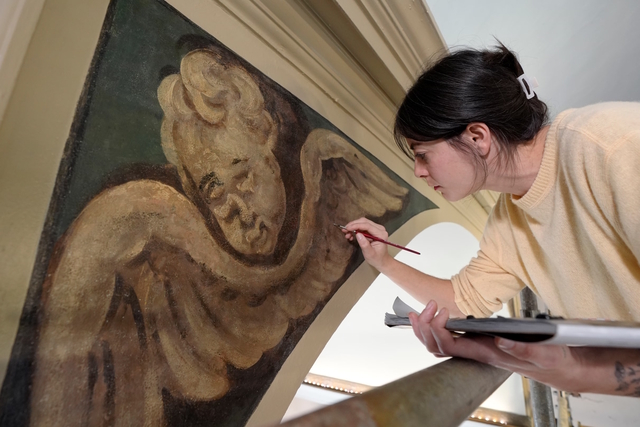
The team employed solvent gels to carefully soften the paint, followed by the use of plastic spatulas and cotton swabs to delicately reveal the intricate details of the murals. As the layers were stripped away, the vibrant colors and unique features of the angels began to emerge. Each figure had its own personality, with distinct expressions, hairstyles, and poses. “It’s been a revelation,” Pocobene remarked. “These are some of the most fascinating works of colonial art I’ve encountered in my 40 years of conservation.”
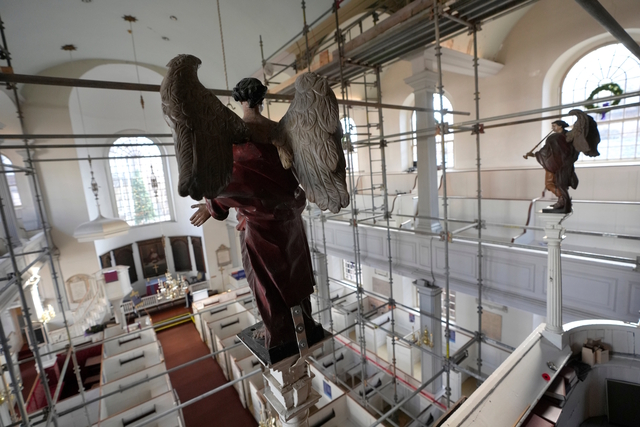
The restoration effort quickly evolved from uncovering a few murals to a full-scale project aimed at restoring all 20 angelic figures. As of now, eight angels have been fully unveiled, with the remaining murals set to be revealed by spring 2025.
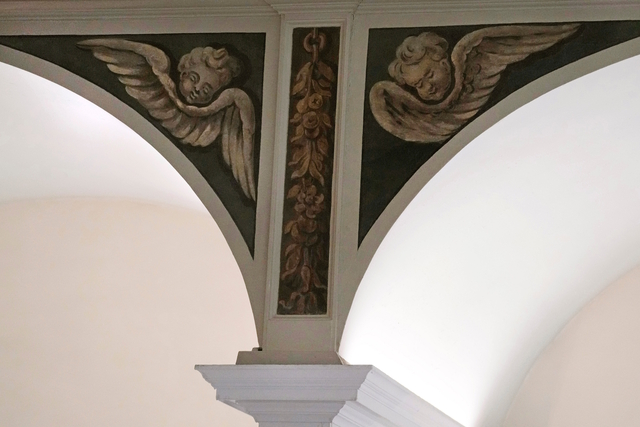
Artistic and Spiritual Significance
The rediscovery of these murals has brought renewed attention to the artistry and spiritual significance of Old North Church. The angels, along with Gibbs’s other decorative works, were designed to evoke a sense of divine presence, offering worshippers a glimpse of “the courts of heaven.” The intricate details and vibrant colors highlight the skill and creativity of colonial artists, as well as the cultural identity of Boston’s Anglican community.
Rev. Matthew Cadwell, the church’s vicar, noted that the murals were more than just decorative art. “They conveyed a sense of divine presence and were an integral part of the worship experience,” he explained. The restoration allows modern visitors to experience the church as its founders intended, surrounded by symbols of faith and beauty.
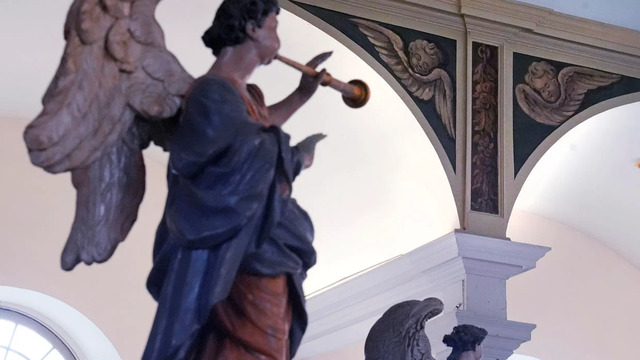
The Dual Legacy of Old North Church
While Old North Church is celebrated for its revolutionary role, its colonial history is complex. The church’s founding congregation included members of Boston’s elite, many of whom benefited from the Atlantic slave trade. Emily Spence, associate director of education at Old North Illuminated, emphasized the importance of acknowledging this dual legacy. “Old North was a beacon of liberty, but it was also shaped by the realities of colonial society,” she said.
The rediscovery of the murals offers a more nuanced understanding of the church’s history. The vibrant interior, now being restored, reflects the identity and values of its early Anglican congregants while also serving as a reminder of the broader social and economic context of colonial Boston.
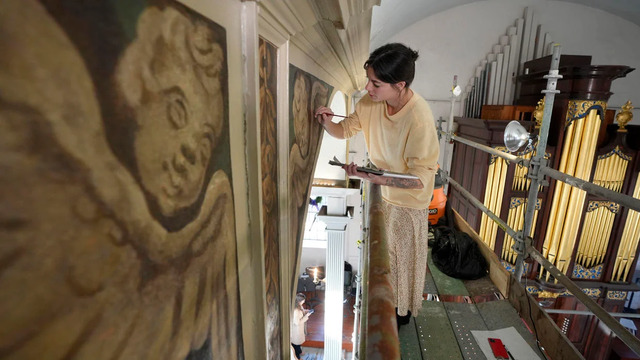
A Transformative Visitor Experience
For visitors, the restoration of the angelic murals provides a rare opportunity to step back in time. The vivid colors and intricate details transport viewers to the 18th century, allowing them to see the church as its original worshippers did. “It amazes me to stand in a space surrounded by original decorations,” said conservator Corrine Long. “When you strip away the layers of white paint, you restore not just the art, but the spirit and history of the place.”
The restoration has also inspired new educational initiatives. Old North Illuminated, the nonprofit overseeing the church’s preservation, has hosted talks and tours to share the story of the murals and their significance. Visitors can witness the ongoing restoration process and learn about the techniques used to uncover these colonial masterpieces.
Conclusion: Preserving a Legacy
The restoration of the angelic murals at Old North Church is more than an artistic triumph; it is a celebration of Boston’s rich cultural heritage. By bringing these long-lost works back to life, the project honors the creativity and craftsmanship of colonial artists while deepening our understanding of the church’s history.
As the remaining angels are unveiled in the coming months, visitors will have the chance to experience Old North Church in its full splendor, just as its founders intended. This remarkable restoration serves as a reminder of the enduring power of art and the importance of preserving our shared history for future generations.
